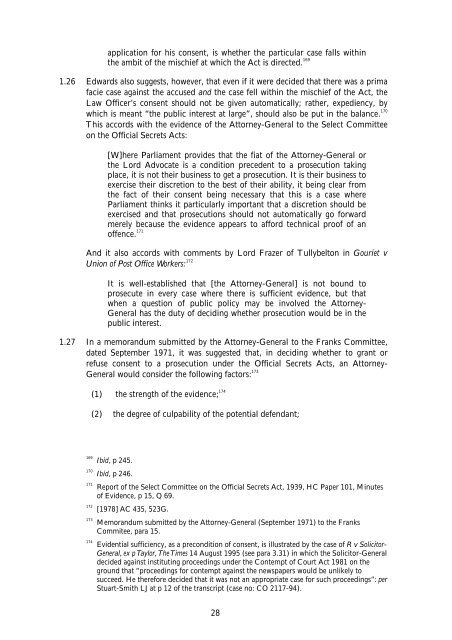cp149 Consents to Prosecution consultation - Law Commission
cp149 Consents to Prosecution consultation - Law Commission
cp149 Consents to Prosecution consultation - Law Commission
You also want an ePaper? Increase the reach of your titles
YUMPU automatically turns print PDFs into web optimized ePapers that Google loves.
application for his consent, is whether the particular case falls within<br />
the ambit of the mischief at which the Act is directed. 169<br />
1.26 Edwards also suggests, however, that even if it were decided that there was a prima<br />
facie case against the accused and the case fell within the mischief of the Act, the<br />
<strong>Law</strong> Officer’s consent should not be given au<strong>to</strong>matically; rather, expediency, by<br />
which is meant “the public interest at large”, should also be put in the balance. 170<br />
This accords with the evidence of the At<strong>to</strong>rney-General <strong>to</strong> the Select Committee<br />
on the Official Secrets Acts:<br />
[W]here Parliament provides that the fiat of the At<strong>to</strong>rney-General or<br />
the Lord Advocate is a condition precedent <strong>to</strong> a prosecution taking<br />
place, it is not their business <strong>to</strong> get a prosecution. It is their business <strong>to</strong><br />
exercise their discretion <strong>to</strong> the best of their ability, it being clear from<br />
the fact of their consent being necessary that this is a case where<br />
Parliament thinks it particularly important that a discretion should be<br />
exercised and that prosecutions should not au<strong>to</strong>matically go forward<br />
merely because the evidence appears <strong>to</strong> afford technical proof of an<br />
offence. 171<br />
And it also accords with comments by Lord Frazer of Tullybel<strong>to</strong>n in Gouriet v<br />
Union of Post Office Workers: 172<br />
It is well-established that [the At<strong>to</strong>rney-General] is not bound <strong>to</strong><br />
prosecute in every case where there is sufficient evidence, but that<br />
when a question of public policy may be involved the At<strong>to</strong>rney-<br />
General has the duty of deciding whether prosecution would be in the<br />
public interest.<br />
1.27 In a memorandum submitted by the At<strong>to</strong>rney-General <strong>to</strong> the Franks Committee,<br />
dated September 1971, it was suggested that, in deciding whether <strong>to</strong> grant or<br />
refuse consent <strong>to</strong> a prosecution under the Official Secrets Acts, an At<strong>to</strong>rney-<br />
General would consider the following fac<strong>to</strong>rs: 173<br />
(1) the strength of the evidence; 174<br />
(2) the degree of culpability of the potential defendant;<br />
169 Ibid, p 245.<br />
170 Ibid, p 246.<br />
171 Report of the Select Committee on the Official Secrets Act, 1939, HC Paper 101, Minutes<br />
of Evidence, p 15, Q 69.<br />
172 [1978] AC 435, 523G.<br />
173 Memorandum submitted by the At<strong>to</strong>rney-General (September 1971) <strong>to</strong> the Franks<br />
Commitee, para 15.<br />
174 Evidential sufficiency, as a precondition of consent, is illustrated by the case of R v Solici<strong>to</strong>r-<br />
General, ex p Taylor, The Times 14 August 1995 (see para 3.31) in which the Solici<strong>to</strong>r-General<br />
decided against instituting proceedings under the Contempt of Court Act 1981 on the<br />
ground that “proceedings for contempt against the newspapers would be unlikely <strong>to</strong><br />
succeed. He therefore decided that it was not an appropriate case for such proceedings”: per<br />
Stuart-Smith LJ at p 12 of the transcript (case no: CO 2117-94).<br />
28
















